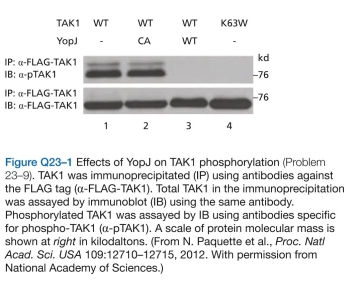
Molecular Biology Of The Cell 6th Edition by Bruce Alberts, Alexander Johnson, Julian Lewis, David Morgan, Martin Raff, Keith Roberts, Peter Walter
Edition 6ISBN: 978-0815345244
Molecular Biology Of The Cell 6th Edition by Bruce Alberts, Alexander Johnson, Julian Lewis, David Morgan, Martin Raff, Keith Roberts, Peter Walter
Edition 6ISBN: 978-0815345244 Exercise 15
Which statements are true? explain why or why not.
-The Gram-negative bacterium Yersinia pestis, the causative agent of the plague, is extremely virulent. Upon infection, Y. pestis injects a set of effector proteins into macrophages that suppresses their phagocytic behavior and also interferes with their innate immune responses. One of the effector proteins, acetylates serines and threonines on various MAP kinases, including the MAP kinase kinase kinase TAK1, which controls a key signaling step in the innate immune response pathway. To deter- mine how YopJ interferes with TAK1, you transfect human cells with active YopJ
acetylates serines and threonines on various MAP kinases, including the MAP kinase kinase kinase TAK1, which controls a key signaling step in the innate immune response pathway. To deter- mine how YopJ interferes with TAK1, you transfect human cells with active YopJ  or inactive YopJ
or inactive YopJ  and with FLAG-tagged active TAK1
and with FLAG-tagged active TAK1  or inactive TAK1
or inactive TAK1  and assay for total TAK1 and for phos- phorylated TAK1, using antibodies against the FLAG tag or against phosphorylated TAK1 (Figure Q23-1). How does YopJ block the TAK1 signaling pathway? How do you sup- pose the serine/threonine acetylase activity of YopJ might interfere with TAK1 activation?
and assay for total TAK1 and for phos- phorylated TAK1, using antibodies against the FLAG tag or against phosphorylated TAK1 (Figure Q23-1). How does YopJ block the TAK1 signaling pathway? How do you sup- pose the serine/threonine acetylase activity of YopJ might interfere with TAK1 activation? 
-The Gram-negative bacterium Yersinia pestis, the causative agent of the plague, is extremely virulent. Upon infection, Y. pestis injects a set of effector proteins into macrophages that suppresses their phagocytic behavior and also interferes with their innate immune responses. One of the effector proteins,
 acetylates serines and threonines on various MAP kinases, including the MAP kinase kinase kinase TAK1, which controls a key signaling step in the innate immune response pathway. To deter- mine how YopJ interferes with TAK1, you transfect human cells with active YopJ
acetylates serines and threonines on various MAP kinases, including the MAP kinase kinase kinase TAK1, which controls a key signaling step in the innate immune response pathway. To deter- mine how YopJ interferes with TAK1, you transfect human cells with active YopJ  or inactive YopJ
or inactive YopJ  and with FLAG-tagged active TAK1
and with FLAG-tagged active TAK1  or inactive TAK1
or inactive TAK1  and assay for total TAK1 and for phos- phorylated TAK1, using antibodies against the FLAG tag or against phosphorylated TAK1 (Figure Q23-1). How does YopJ block the TAK1 signaling pathway? How do you sup- pose the serine/threonine acetylase activity of YopJ might interfere with TAK1 activation?
and assay for total TAK1 and for phos- phorylated TAK1, using antibodies against the FLAG tag or against phosphorylated TAK1 (Figure Q23-1). How does YopJ block the TAK1 signaling pathway? How do you sup- pose the serine/threonine acetylase activity of YopJ might interfere with TAK1 activation? 
Explanation
The statement "if a substance undergoes ...
Molecular Biology Of The Cell 6th Edition by Bruce Alberts, Alexander Johnson, Julian Lewis, David Morgan, Martin Raff, Keith Roberts, Peter Walter
Why don’t you like this exercise?
Other Minimum 8 character and maximum 255 character
Character 255


